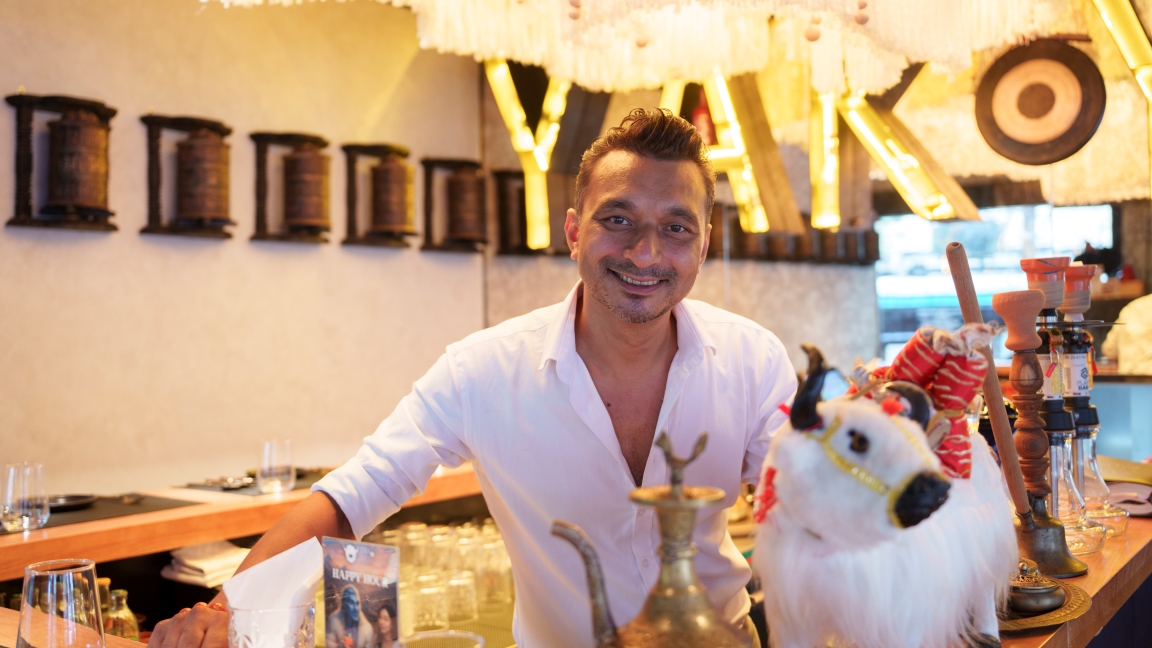[Industry Insights] How is Shanghai Hospitality Industry Doing?
![[Industry Insights] How is Shanghai Hospitality Industry Doing?](https://obj.shine.cn/files/2025/09/28/b4c8e559-2e19-48e8-a69a-75c8aef065b4_0.jpg)
The 6th Annual Golden Spoon Awards went down at the Langham Xintiandi last week, and like all good industry nights, it was equal parts tuxedos, trophy-hoisting, and people not-so-quietly checking their WeChat during speeches. Shanghai cleaned house – snagging more than 40% of the prizes, which is less a statistic than a confirmation of what everyone in the ballroom already knows: this city eats better, sleeps fancier, and parties harder than just about anywhere else in China. If you missed the full list, we published it here.
But the real meat wasn't on stage. It was in the wings, where the city's top hotel execs were balancing champagne flutes in one hand and plates of French cheese and New Zealand ice cream in the other, while politely dodging photo ops. That's where I managed to corner a few of them for quick, between-bites conversations about what's next for hospitality in Shanghai.
For expats living in Shanghai, the takeaway is both clear and encouraging. With new visa-free travel agreements opening doors to more than 100 countries, hotel executives are betting on a fresh wave of international visitors – and shaping their brands accordingly. That means more ambitious hotel projects, sharper dining concepts, and new cultural touchpoints across the city. From Langham's ambitious China pipeline, to Kempinski's reinvention in Pudong, to BTG's drive to create a truly global Chinese luxury brand, one message came through again and again: the future here looks surprisingly, and refreshingly, optimistic.
![[Industry Insights] How is Shanghai Hospitality Industry Doing?](https://obj.shine.cn/files/2025/09/28/49e64d90-1619-4827-a3ac-7152b7f1a473_0.jpg)
First up, while everyone was designated a VIP at the event, Mr Bob van dan Oord is categorized as a VVIP. His genial nature completely dispenses with any sort of pretense that might be preconceived by that extra "v." In addition to being a delight, he's the Global CEO of Langham Hospitality Group.
CNS: So, Bob, under your leadership, Langham has expanded significantly worldwide, with a strong focus on China. What are your plans for the next five to ten years in this market? Oh, and welcome back to Shanghai!
Bob: We're thrilled to be back in Shanghai. When I started, Langham had just five hotels; today we operate 32 across four continents, with another 15 in the pipeline. In China specifically, I see us growing to around 30 hotels in the coming years. It's an exciting and important growth region for us. With China's expanded visa-free agreements, we see inbound travel has already risen, and we expect that trend to continue. With the government's new initiatives, we're very optimistic about sustained growth in tourism.
CNS: Is this your first time in Shanghai?
Bob: Not at all. I've been here many times. In fact, I used to run this very hotel in my early days with Langham, and I've always loved it.
CNS: That's a pretty long association with the city!
Bob: Absolutely. Shanghai has transformed dramatically over the years, and so has this hotel. The city today is incredibly vibrant. The bars and restaurants are lively, and the galleries and museums are world-class. It truly feels like the Paris of the East, especially with its thriving fashion scene. Walking through the streets, you can feel the energy of the younger generation. I'm not alone in this sentiment; many in the hospitality industry see really incredible things in Shanghai. I often joke with my team in Hong Kong that maybe we should move our headquarters here – it's that dynamic.
CNS: After that comment, I'm sure you'll be receiving plenty of invitations!
Bob: (laughs) I wouldn't be surprised.
![[Industry Insights] How is Shanghai Hospitality Industry Doing?](https://obj.shine.cn/files/2025/09/28/27e9b2fe-31a1-48d5-b12b-d89bf01113cf_0.jpg)
I then took a moment to speak with Mark Kirk, the General Manager of the Grand Kempinski here in Shanghai. He was here when the hotel transformed from the previous Gran Melia, and has been operating the waterfront property since 2019.
CNS: Mark, start us off with a bit of Shanghai history. It's not often we talk to GMs who spearheaded transitions.
Mark Kirk: It was an exciting transition. When we took over from Meliá, we brought in a task force to reshape the culture and infuse Kempinski's European hospitality style while keeping a strong Chinese influence. The hotel itself was a natural fit for the Kempinski brand, particularly because of its reputation for Western cuisine. In addition to an excellent Chinese restaurant, we have standout Spanish and Italian restaurants, along with all-day dining and top-quality catering. Western cuisine remains one of our defining strengths.
CNS: If I'm not mistaken, your hotel was also the first in Shanghai to bring over Le Petit Chef?
Mark Kirk: That's right. As far as China goes, we felt Shanghai would make for the perfect launch pad for this type of dining experience. We introduced Le Petit Chef last year – an interactive dining experience that's been extremely popular. We've recently updated the theme to Battle of the Chefs. It's a live, animated dining show: projectors display a tiny chef preparing the dish on your plate, and then our staff serve the real dish, closely matching what you just watched. It's immersive and a lot of fun, and because of its success, we've decided to expand on it.
CNS: Tell us a little about the Shanghai tourism rebound and the impacts of the visa-free agreements.
Mark Kirk: The impact is very positive. Tourism is growing steadily again. For example, my sales director is currently in Russia, which is now a visa-free market for China. That's an important opportunity, and with our German roots, we also continue to attract strong European business. Personally, I believe Shanghai could still benefit from more hotels. The city is expanding – airports, train networks, accessibility – and demand is there. Many hotels, including ours, run year-round occupancy in the high 70s. Last year we averaged 77%, and this year looks very similar, with peak days at full capacity. That's a very healthy sign for the industry.
CNS: During 2020-2022, many hotels in Shanghai directed efforts to activate the domestic staycation market. Has that work led to overall growth in the hospitality sector?
Mark Kirk: Absolutely. The staycation market is still growing. In fact, our highest revenue days in the hotel's history happened during those years. It was the same for many luxury hotels in Shanghai. While sentiment in the economy has ups and downs, Chinese travelers have more wealth and more leisure time than before, and that combination drives staycations. Government initiatives, like consumer vouchers, have encouraged people to spend and travel locally. The market is very last-minute, which makes it harder to predict, but the demand is there. For example, going into October 2nd, we're sitting at 45% occupancy – and having been in Shanghai since 2019, I can say that at the rate we're at now, we'll be at full capacity for the entirety of the holiday.
CNS: And what are your thoughts on this year's Golden Spoon awards?
Mark: I would also like to mention a big thank you to Cherry Li and Grand Hotels. They bring a lot to the industry.
They push the industry on the quality, they push us to excel. So a big thank you, a big shout out to Grand Hotels and Cherry Li.
![[Industry Insights] How is Shanghai Hospitality Industry Doing?](https://obj.shine.cn/files/2025/09/28/24c655ba-6ac9-4279-9f5a-15c5216fc794_0.jpg)
CNS: Please go ahead and introduce yourself.
Andy: My name is Andy. I'm the Deputy General Manager for NUO Hotels. I'm also based in Beijing and work with Beijing Tourism Group (BTG), which is one of the largest tourism groups in China. Our group spans hotels, retail, and transportation. We own Capital Airlines and are also the main shareholder of Universal Studios Beijing.
Within hospitality, BTG has created a new brand under BTG Hotels. Right now in Beijing, we operate three types of hotels: a heritage hotel, a resort, and an urban property. Our flagship for the NUO hotel brand has just launched in BJ.
CNS: Starting in Beijing is interesting, since many southern Chinese cities attract heavier tourism traffic. But Beijing remains a strong base, particularly with government and business travelers. Are there plans to expand into Shanghai over the next five to ten years?
Andy: Yes, absolutely. Shanghai is a top priority. Every day, there's a huge flow of people traveling between Beijing and Shanghai. Our goal is to bring our flagship brand NUO to Shanghai. Our first flagship hotel in Beijing was inspired by the Ming Dynasty, and we want to replicate that concept in Shanghai – whether through heritage or modern-style properties.
In fact, BTG already has offices in Shanghai. Through our Homeinn brand, we cover the economy segment. We also manage multiple other brands – full-service and limited-service – some in partnership with Hyatt. And beyond that, we're already in negotiations for a new high-end project in Shanghai, which we hope to open next year.
CNS: Will that be a lease or a new build?
Andy: We are open to both leasing and developing. In some cases, we also invest directly in properties if they're truly exceptional.
CNS: How do you see the future of hospitality in China, especially with the current economic environment?
Andy: I've worked in this industry for 23 years, and I'm very confident in its future. Hospitality will continue to grow. Right now, we are drafting our next five-year plan. Expansion in China is one priority, but equally important is growing overseas.
China does not yet have a well-established luxury hotel brand recognized globally, and this is one of our stated aims with the NUO brand, whose slogan is The Essence of Chinese Opulence. We see this as a huge opportunity. Our goal is to create a Chinese luxury brand that represents our culture abroad – whether in Southeast Asia, Europe, or the United States.
CNS: That would make your new brand both a flagship in China and an ambassador abroad?
Andy: Exactly. It's about showcasing Chinese culture to the world. Of course, this takes time. Brands like Kempinski have over 100 years of history; our new brand is just 10 years old. But we've already built three flagship hotels in Beijing and have new projects on the way.
Our vision is to combine Chinese culture with the local culture of each city we enter. This way, we don't just present Chinese hospitality – we create meaningful cultural exchanges through our hotels.
So what does all this really mean – beyond champagne cheers and award night selfies? It means Shanghai is doubling down: the city's not just chasing global snapshots, it's redefining what "world-class" looks like from the inside out. The visa policy shakeups are unlocking new guest flows, the staycation boom proved that locals will pay for the dream next door, and homegrown brands like BTG/NUO are daring to aim beyond domestic fame.
When the lights went down at the Golden Spoons, the numbers told their own story: Shanghai carried away twenty-six of sixty-three awards, a clear signal of where the country's center of gravity in hospitality lies. The sweep was decisive, but more than that, it was predictive: Shanghai isn't just leading China's hospitality industry, it's defining the expectations against which the rest will be measured. How's this for a bit of Shanghai pride?




In Case You Missed It...
![[SH Buzz] 8 New Restaurants in Shanghai for Oct](https://obj.shine.cn/files/2025/10/28/22fd7254-be87-4bc2-9a4d-079b37099685_0.jpg)


![[See & Be Seen] Shanghai Snags Over 40% of Golden Spoon Awards](https://obj.shine.cn/files/2025/09/29/a9d8248d-ace7-419e-90a5-3b2fd0aacbe2_0.jpg)



